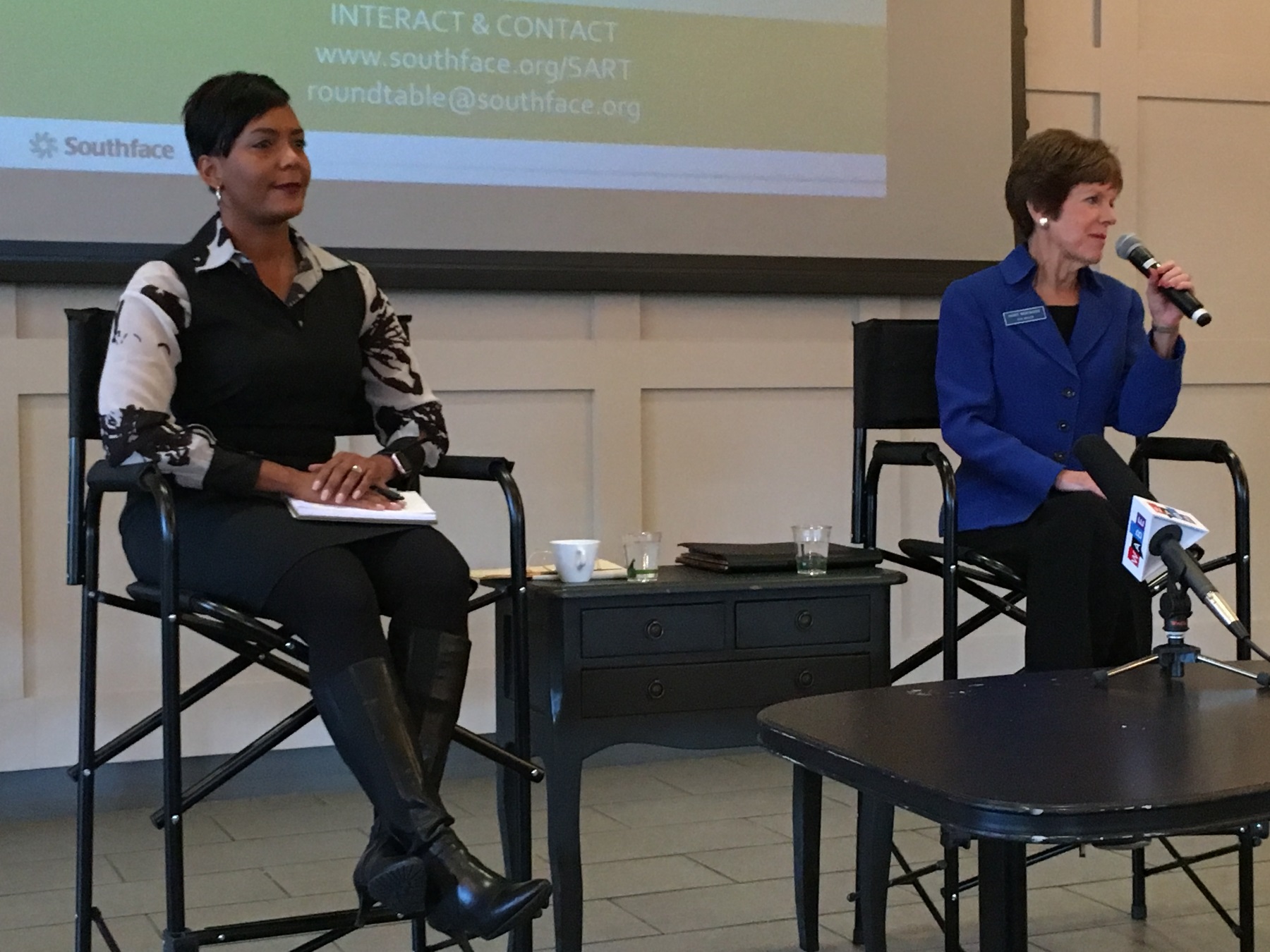Atlanta Mayoral Candidates On Bikes, Parks And Population

Keisha Lance Bottoms, left, and Mary Norwood took questions Friday on sustainability, transportation and infrastructure at Southface Energy Institute’s monthly Sustainable Atlanta Roundtable.
Molly Samuel / WABE
Atlanta mayoral candidates Keisha Lance Bottoms and Mary Norwood faced off Friday morning for the first time since Tuesday’s election sent them to a Dec. 5 runoff. At a morning forum on sustainability, Bottoms emphasized community outreach while Norwood focused on policy.
Toward the beginning of the event, Bottoms said her biggest challenge will be separating herself from Mayor Kasim Reed, who’s been a vocal supporter of her campaign.
“I think the current mayor has done an incredible job with this city in pushing us forward, but it’s important that each administration be able to define themselves differently,” Bottoms said
On environmental issues, Bottoms said the key is explaining to people why they should care.
“For me, I have children who are asthmatic, and many people in underserved communities deal with that,” she said. “That’s a reason to care about the environment.”
Norwood said she would continue Reed’s environmental efforts.
“Whether it’s water, whether it’s clean energy, whether it’s continuing our green building challenge, whether it’s implementing the climate action plan, we need to make sure that all of that is done, without politics,” she said.
Norwood and Bottoms took questions from the audience at Southface’s Sustainable Atlanta Roundtable. (Video of the event is on the organization’s Facebook page.)
Bike Lanes, BeltLine, Transit
There have been a couple of bike lane controversies in Atlanta: a lane in front of a church that was removed, and a lane along Peachtree Road that was suggested, but never happened.
“I think it is about educating our communities,” Bottoms said. She said when the city proposed changes to Cascade Avenue, people were upset, including about proposals to make it more bike-friendly.
“It’s about sometimes having uncomfortable conversations, and we’re not just making decisions for today. We’re making decisions for the future,” she said. “The area that I currently represent on City Council, for the most part, we don’t even touch the BeltLine, but it’s about making people understand this is where we’re trying to get as a city.”
Norwood said Buckhead is different from the rest of the city, and Peachtree is clogged with congestion. So while she didn’t make any promises about revisiting the Peachtree bike lane, which she had opposed, she did say she’d work to make sure cyclists have a way to get to Buckhead.
On broader transit issues, Norwood said the city has a “tremendous opportunity” with the transportation sales tax.
“We have a once-in-a-lifetime opportunity to get this right. We need a regional transit system,” she said. “Yes, we need to build out the BeltLine, but it’s more than that.”
Parks
Both candidates said they’d commit to a parks and greenspace task force and would prioritize park maintenance.
Norwood said she wants to see more regular maintenance.
“I want to see some of our young people involved in parks maintenance,” Norwood said. “I think we can have a lot of our young people involved through a public-private partnership and they are paid stipends or whatever, but they get involved in their community and in their local parks.”
Bottoms said she helped bring jazz to parks other than Piedmont.
“The reality is that in many of our communities, people just don’t use the parks because they think they’re for someone else,” she said. “I think it goes back to helping our communities understand why our parks matter.”
Population Growth
An audience member asked how the candidates plan to prepare for people moving to Atlanta who are fleeing sea level rise and hurricanes.
Norwood said she wants to see more housing near MARTA stations, and she supports the Atlanta City Design Plan, which lays out how to add density in the city.
“The neighborhoods will be protected, and we will densify along the corridors,” Norwood said.
It’s all tied up with affordability, education and transportation, Bottoms said. If a family moves to Atlanta but can’t afford an in-town neighborhood with good schools, they’ll live in a cheaper suburb with better schools, and they’ll add to traffic congestion as they commute to work.
“We have to make sure each of our communities are a destination community,” Bottoms said. “When you have communities that have thriving schools and a thriving education system, you’ll get younger families,” which will lead to more businesses in those communities, and fewer people driving, Bottoms said.








